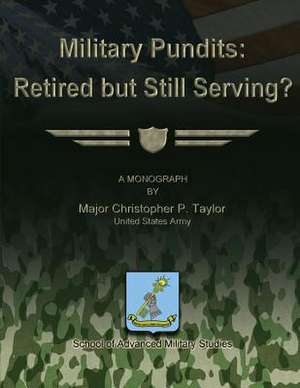Military Pundits
Autor Us Army Major Christopher P. Taylor Contribuţii de School Of Advanced Military Studiesen Limba Engleză Paperback
Preț: 115.12 lei
Nou
Puncte Express: 173
Preț estimativ în valută:
22.04€ • 23.94$ • 18.52£
22.04€ • 23.94$ • 18.52£
Carte disponibilă
Livrare economică 31 martie-14 aprilie
Preluare comenzi: 021 569.72.76
Specificații
ISBN-13: 9781479329557
ISBN-10: 147932955X
Pagini: 70
Dimensiuni: 216 x 279 x 4 mm
Greutate: 0.19 kg
Editura: CreateSpace Independent Publishing Platform
ISBN-10: 147932955X
Pagini: 70
Dimensiuni: 216 x 279 x 4 mm
Greutate: 0.19 kg
Editura: CreateSpace Independent Publishing Platform
